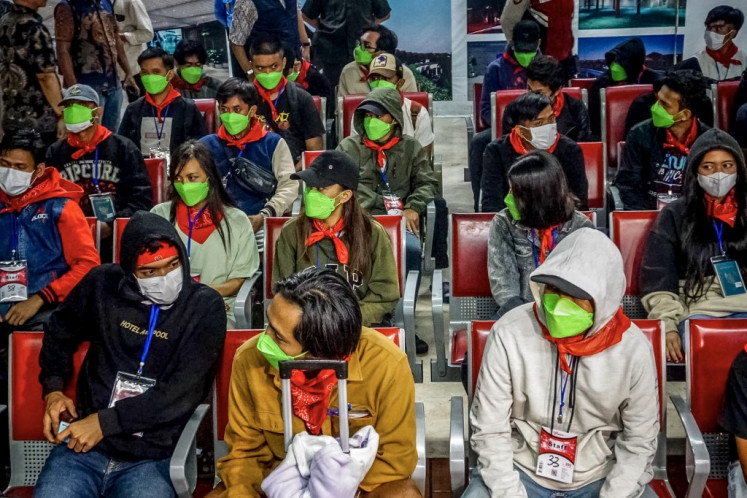Popular Reads
Top Results
Can't find what you're looking for?
View all search resultsPopular Reads
Top Results
Can't find what you're looking for?
View all search resultsEconomic opportunity and the danger of low law enforcement
Entering the New Year of 2012, we should be optimistic because doing so will enliven us towards a better future
Change text size
Gift Premium Articles
to Anyone
E
ntering the New Year of 2012, we should be optimistic because doing so will enliven us towards a better future. It is rather unfortunate, however, that Indonesia has plenty of unfinished business dating back to 2011, and has even skipped swept some of that business under the rug, sometimes through hidden intentions, sometimes through sheer incompetence.
Foreign observers have lauded Indonesia’s economic performance thanks to its steady economic growth and solid rupiah. And yet that belies the widespread poverty and increasing disappointment among the masses. Endemic violent conflicts in the regions that may be caused by the slightest provocations provide a strong indication of this.
It’s pretty enigmatic to see that Western politicians praised Indonesia’s democratization process, which took place under apparently weak national leadership. How come the highest authorities of the Republic, including the President have been powerless to deal with a recalcitrant mayor who resists the rulings of the Supreme Court?
Don’t wonder if other mayors and regents will follow suit in the near future. This would only contribute to a weakening of government institutions and may even lead to a failed state. Ever since time in memory, governments have been there to put order in place and where possible establish justice. In the aftermath of absolutism, the government’s single instrument is the law.
The law is indispensable because the human being is endowed with a capacity to make choices, which if not “controlled” would be made at individual discretion. Without the law, people’s behavior will run against each other, ensuing in a situation where people fight each other along the lines of Thomas Hobbes’ “homo homini lupus”.
The law tells people individually what they must or must not do. As such, the law is something that renders members of society to conform to the norms of human behavior, from which a balance of interests is established. Law enforcement takes place when it responds with sanctions against those who cross legal borders, causing order and peace to be jeopardized. It is a truism that law enforcement keeps a society intact and functioning.
In normal societies we will “feel” the law whenever we cross its borders and breach it. The stronger that feeling lasts, the better the society in terms of order and peace. In abnormal societies we tend to forget how the law feels.
That absence of feeling is a result of the general neglect of sanctions against the breach of law. The law might be there, perhaps it may even be crystal clear because it had been well written, but only with mediocre enforcement, or not at all.
People will generally ignore the law, particularly if law enforcers tend to keep aloof from enforcing it. In corrupt societies, law enforcers used to act against breaches of law only whenever it was “deemed fit”, thereby giving way to the factor of “trading”, which is when people do not give for what they don’t receive.
The importance of the role of law enforcers cannot be underestimated, because they will decide whether the law will render order and eventually serve justice, or whether it simply becomes a dead letter. The renowned Roman jurist and statesman, Marcus Tullius Cicero (106–44 BCE) famously declared that “the government is the speaking law, while the law is the silent government.” Should there be a profound incongruence between the two premises, big trouble would loom over the state and society.
It is rather unfortunate that Indonesia belongs to the group of countries where such incongruence exists. Any society will be threatened if it suffers dysfunction. That is exactly what happened with Cicero’s West Roman Empire at the end of its days in 476 CE.
During Indonesia’s Reformasi era almost 14 years ago, we saw countless laws and regulations promulgated. Some laws have been enforced stringently, while others have been left out in the cold. Worse still, some significant laws have even been trampled on, like in the field of basic human rights or transparency of the judiciary. The evolving situation indicates a dangerous trend of increasing lawlessness.
Sure, somebody must act to put an end to such a trend, lest Indonesia and its people run the risk of losing a lot. Nevermind that the people have played by the democratic rules and prudently elected a legitimate government. As by virtue of the Constitution, the government has been furnished with sovereign power to enforce the law, and people expect a government that acts.
But what if the government does not act, or acts half-heartedly? Then we may fear that people will not “feel the law” and may feel betrayed. Disappointed people increasingly tend to take the law into their own hands. By then not only mayors, but the youth, farmers, merchants and probably the army, will deem it much more effective if they forget about a government that is silent and speak the law on their own. By then, we may have forgotten the wise words of Cicero.
The writer is formerly professor of the philosophy of law.










